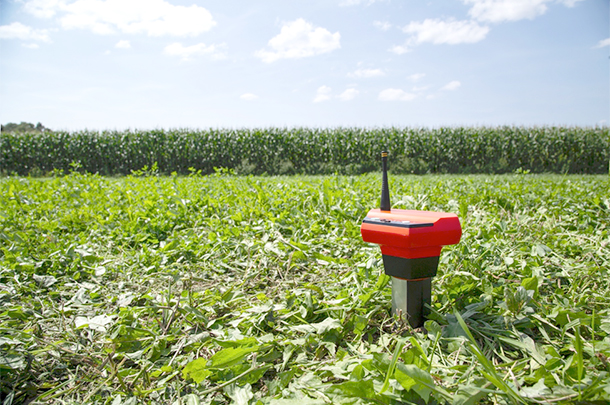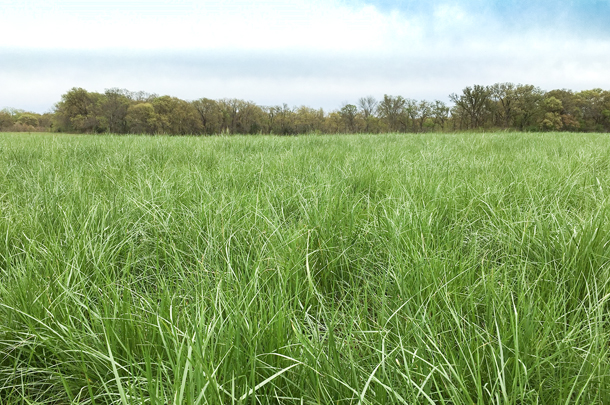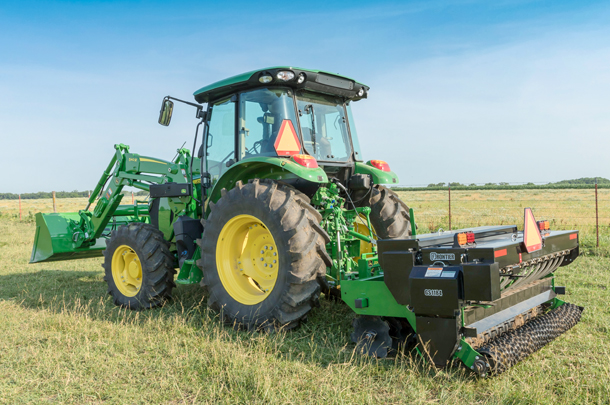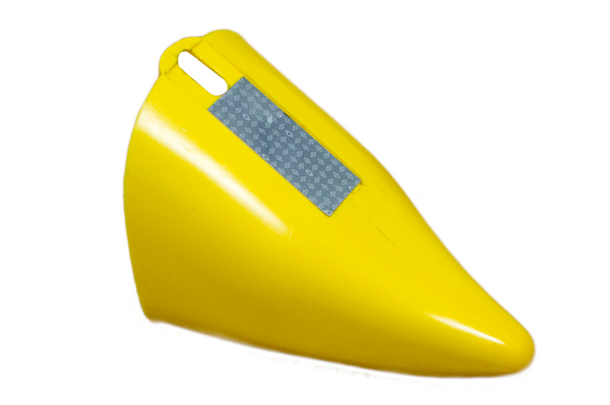The new hay stacker will pick and stack the following:
- 12 (3X3) dry bales per load
- 6 (3X4) dry bales per load
- 4 (4X4) dry bales per load
- 8 bundle packs of 21 small square bales per pack per load (168 small square bales per load)

Wireless NPK soil probe released by Teralytic
Soil analytics company Teralytic has released a limited number of their wireless soil probes to be delivered in time for the 2019 planting season. The probe contains 26 sensors, including the world’s first wireless NPK sensor, and its platform helps farmers produce more food with fewer resources by improving soil health in the fields. Probes are available worldwide.
Combining a focus on soil health with artificial intelligence, machine learning and cloud technologies, the company aims to reduce inputs and save farmers time by diagnosing the soils. While drone and camera-based technologies can find problems as they appear on the plants, this new probe warns farmers of changes in the soils before they become problems.
Traditionally, soil testing is a manual and time-intensive process that can take days or weeks. But the probe’s sensors continuously check and report on soil quality – 24 hours a day and 365 days a year – so farmers can take action sooner:
- Microclimate sensors measure air temperature, humidity and light; soil sensors measure soil moisture, salinity, soil temperature, pH and NPK; and gas sensors measure aeration and respiration.
- Sensors take a snapshot of soil conditions every 15 minutes.
- Probes connect to a gateway through LoRa wireless technology. The gateway sends data to the cloud via either cellular, satellite or a standard internet connection, which can be accessed on any cellular device or desktop computer.
- Farmers can look ahead and gain insights about soil’s fertility now and into the future on an easy-to-use dashboard.

New summer-dormant tall fescue variety released
Noble Research Institute researchers have developed and released a new tall fescue variety called Chisholm to provide a new forage option for agricultural producers in western Oklahoma and Texas.
Tall fescue is a cool-season perennial grass, which means it produces forage for livestock from fall to spring and does not need to be replanted each year. Chisholm is the first tall fescue variety released by Noble that is adapted to the hot, dry summers typical west of Interstate 35 in Oklahoma and Texas, where tall fescue has traditionally been unable to persist.
Chisholm was developed from Mediterranean tall fescue, which persists in environmental conditions similar to the Southern Great Plains. In the past, many introduced cool-season perennial grasses were selected from cooler climates in northern Europe. As a result, these grasses were unable to persist in the hot and dry summers typical of western Oklahoma and Texas.
Mediterranean-type tall fescue varieties, including Chisholm, are summer-dormant, which means they stop growing during the summer in response to long days, high temperatures and dry conditions. They start growing again in early fall in response to moisture and cooler temperatures.
Perennial grasses like Chisholm can also benefit soil health by sequestering carbon in the soil year-round, improving organic matter and reducing soil erosion.

Deere bolsters seeding lineup
John Deere bolsters its lineup of Frontier equipment with the addition of overseeders.
Frontier GS1148, GS1160, GS1172 and GS1184 ground-driven overseeders are commonly used for primary seeding, overseeding and other applications that include establishing cool- and warm-season grasses and wildlife food plots.
Available in 4-, 5-, 6- and 7-foot (1.22-, 1.52-, 1.83- and 2.13-meter) wide models, the new ground-driven overseeders can be equipped with three seed-box options fitted with fluted seed cups and an agitator for accurate, uniform delivery of grass seeds. The four models include spiked rollers or disc blades that can be set to provide more or less cultivation of the soil. Seeding rates can be adjusted as needed by engaging or disengaging the seed boxes on the overseeders. Cultipacker options can also be added for good seed-to-soil contact and soil finishing.

New Snoot Boots extend life of corn head snout points
May Wes is pleased to introduce its new Snoot Boots for John Deere, Case IH and New Holland corn head snout points.
Designed with a smooth surface to aid in preventing trash buildup, the highly visible Snoot Boots easily slide and snap over existing snout points. Manufactured from long-lasting, heavy-duty, high-impact plastic, the snout point protectors protect and extend the life of OEM snout points. They feature a reflective metallic strip, making it easier for combine operators to see their snout points in downed corn and after dark.
Case IH and New Holland snout point protectors are available in gray for Case IH 2200, 2400, 2600, 3200 and 3400 series corn heads and New Holland 98C, 98D and 99C series corn heads. John Deere snout point protectors are available in yellow for 90 and 600 series corn heads. Snoot Boots are sold per snout. ![]()
—Compiled by Progressive Forage staff
PHOTOS: Photos courtesy of Morris Industries Ltd., Teralytic, Noble Research Institute, John Deere and May Wes Manufacturing.










